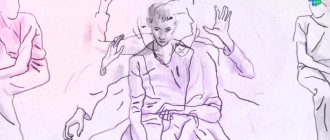June 02, 2021
“Labor made a man out of a monkey,” “labor feeds a man, but laziness spoils him”—many sayings have been invented about labor. From time immemorial people have been working. Parents teach their children to work from an early age. In all children's institutions, children are taught to work.
Work teaches, educates, and strengthens a person. Having woken up, a person immediately begins to work in the morning. Cook breakfast, make the bed, work, study. Perhaps someone is lazy and working. But there are people who are very afraid of this activity. These are ergophobes.
Ergophobia is the fear of doing work. This condition greatly spoils a person’s social life. This fear conceals the fear of change.
People who are used to doing everything perfectly suffer from this fear. Since their reputation is high, they are afraid to take on new tasks so as not to embarrass themselves.
Reasons for fear of work:
- Social phobia. A person is afraid to work in a team, he is oppressed by office styles, he cannot communicate with people at all and this makes him afraid of any work, because any work involves communication in a team.
- Mental disorders. While at work, such people may begin to panic, experience anxiety, and cannot concentrate on work.
- Negative work experience (usually the first). It appears in people who have already had a job before. Perhaps there was a serious conflict in the workplace (injury, workplace robbery, quarrel with colleagues), after which a strong fear of work took hold in the head.
- Dismissal is a thing of the past. After losing a previous job, a person is afraid that he will be fired again, so he does not look for a new job.
- Having a certain type of job. For people whose work involves frequent checks.
- Taking medications. Fatigue and irritability are side effects after taking some strong medications. Work and everything connected with it becomes an irritant. At a subconscious level, a person attaches negativity to work and any thought about professional activity causes a strong reaction.
- Constant stress. Stressful situations affect work activities.
- Diseases. People with mental disorders have the hardest time finding a new job. They are afraid of rejection, afraid of new acquaintances and unknown conditions.
Others and work colleagues may not notice their colleague’s fear. A person hides his emotions very well, and sometimes even controls them to some extent. But in the future the situation worsens and leads a person to withdrawal from society and deep depression.
Ergophobia - what is this phobia?
Ergophobia is complex in nature, since it often accompanies many other phobias and mental disorders.
For example, a patient may be afraid to perform manual labor for fear of injury. Many ergophobes are afraid of any work. In most cases, there is also a fear of communicating with people.
Ergophobia can be incredibly debilitating because people with ergophobia are always dependent on others to feed them, to give them money. These unfortunate people often have tense relationships with loved ones. Sometimes they do not even have the opportunity to turn to anyone for help due to limited finances.
Symptoms of fear of work:
- the expectation that something terrible and irreparable will happen at work;
- self-humiliation (I am not capable of anything, I will fail everything);
- low self-esteem;
- searching for all possible ways to avoid failure to fulfill one’s official duties.
- Fear of colleagues and especially superiors.
- Reluctance to get ready for work in the morning.
- Frequent sick leave.
- Refusal to participate in activities outside of work.
- Fear of changing jobs.
- Fear of new assignments.
- Being in a state of constant quality control of work.
- Panic feelings of speaking in front of a group.
Physiological manifestations of ergophobia
Unfortunately, fears and depression are not the only problem of an ergophobe. Due to the fact that a person is in constant tension, the nervous system becomes unusable. The fears that haunt a person in his consciousness begin to visit him in his sleep in the form of nightmares. If during this period the ergophobe still continues his work activity, then the inability to cope with responsibilities is added to the illness, and then the fear of losing his job.
Work begins to cause panic attacks, which manifest themselves as:
- tachycardia;
- headaches;
- dizziness;
- confusion;
- speech disorders;
- tremors of the limbs;
- chills;
- feelings of unreality of what is happening;
- fainting.
Therefore, in addition to the most disastrous consequences, ergophobia leads to the fact that a person stops taking care of his appearance, which further reduces the chances of getting a job. That is, ultimately the disease brings the ergophobe to the very bottom of society.
Self-help:
- Recognize your problem. Acceptance means giving up accusations and forming a normal attitude towards one’s personality.
- Change your attitude towards work.
- Work on your mistakes.
- Switch your attention to something new for you.
- Be positive. Create a list of values for yourself. These will be your priorities, on which it is important to spend your energy resources. Everything else is nonsense.
- Try to start working not at the full rate (0.25 or 0.5). This is a good chance to take a closer look at the team and management.
- Find a job that you like, that will inspire you, and that will give you self-confidence.
- Take care of your health. Eat right, get enough sleep, and don’t forget about physical activity!
Take care of yourself
You may have to work late or on weekends to keep your job. Add to this anxiety about family, health and the future in general - it’s not far from burnout. To avoid this, take at least 15-20 minutes a day to take care of yourself.
Get some air, cook your favorite food, listen to music or podcasts, meditate, play with your pet, read a few pages of a book, exercise, go to bed a little earlier - all this will help you feel more stable. And even if the worst happens and you lose your job, it will be easier for you to survive the difficulties.
Treatment of fear:
- Belief. The specialist convinces the patient during a personal conversation that it is possible to engage in productive work activities without fear.
- Graphic arts. The specialist asks you to write your fear on paper and burn it, or cut it with scissors. Method of burning fear.
- Meditation. A person suffering from a fear of work convinces himself that his fears are in vain, and it is absurd to associate unhappiness in life with work.
- Relaxation. Allows you to relax and restore peace of mind.
- Cognitive behavioral therapy. The most effective treatment. Has high recovery rates.
- Hypnotherapy. The specialist puts the patient into a trance state. With it, the work of consciousness is turned off and the psychologist can work with the unconscious part of the personality. This approach allows you to effectively identify the cause of fear and eliminate it.
If something resonated with you while reading the text and it seems to you that the situation and symptoms described in the article are similar to your case, and you would like to solve this problem, you can call me first at + 7 (926) 169-36 -63 to talk about your problem that you want to solve.
The duration of the telephone consultation is 20 minutes (free of charge) , during which time I must decide whether I can help you within the framework of psychoanalytic counseling. If it’s easier for you to write a letter, you can do this by clicking on the link and sign up for a consultation. I ask you to describe your situation in as much detail as possible - the size of the letter is unlimited, I will definitely read your letter and respond.
I am always near.
Admit to yourself that you are afraid
Usually we don’t want to experience negative emotions, we avoid them. And in general, we are accustomed to believing that in order to achieve success, we must not stand still, but always run forward. So it's only natural that we don't want to slow down and face our fear. But it is necessary.
Don't try to hide this feeling deeper, but acknowledge it. Describe your emotions on paper, talk to a friend or colleague you trust. Most likely, you will see that you are not alone, and others are experiencing the same thing.
Phobias and their formation as a result of a traumatic event
It is also important to note that the level of anxiety can increase, either as a result of long-term adaptation to traumatic circumstances, as in the case of a child and his unbalanced father, as described above, or sharply. A person may become anxious as a result of a high-intensity traumatic event. And then a phobia may immediately arise if the event had a bright semantic connotation.
Let's look at another example. Let's say there was a holiday - a teenager's birthday. And for even more fun, the parents invited a clown to perform. Everything went well, everyone had fun. But suddenly one of the relatives became ill and as a result he died right during the holiday.
As a result of such circumstances, a teenager will develop an increased level of anxiety after understanding the situation. And also, as an addition to this, a phobia associated with clowns or, even worse, holidays will appear.
Of course, much will depend on what the adults who are significant to the child, in this case the parents, say and what they do. With a competent approach, if you have a certain calming conversation with the child, which will teach him to have a more philosophical attitude towards life and failures, phobias can be avoided. But working with anxiety will take much longer.
Give yourself time
It will be hard at first. You will absorb and comprehend new information, and you will have much less energy left for work than usual. This is fine.
It’s normal to be shy and hesitant before asking your colleagues a question. It’s okay to ask again. It’s okay to joke inappropriately. Feeling tired, even if you seem to have done nothing all day, is also normal. These are temporary difficulties that we agreed to accept at the very beginning of the text.
After a few months, the tedious awkwardness will be replaced by your usual productivity. Well, okay, not a change - it’s unlikely that you will turn into a carefree, cheerful person who loves to be the center of attention. But you will definitely feel better, and going to work will no longer put you in stress.
Accept temporary difficulties
You will feel out of place - you can’t live without it. Even if you have everything in order with soft skills and you are the soul of the company, it still takes time to remember the names of your colleagues and understand the processes. Personally, the first few days are the hardest for me to cope with stress. Therefore, when I start a new job, I briefly lower my expectations of myself.
I know that in the first week I will definitely not do anything remarkable - simply because most of the time I will be worried and aware of what is happening. On the very first day, I skip lunch because I'm too nervous, and then I go home on shaky legs. My adaptation always goes like this - I know about it and one day I made a strong-willed decision to just come to terms with it. There is no escape from this, this is my usual path to assimilation - and there is no other way. So I'll go this way. It will be uncomfortable, but one day the bumps will end – and somehow unnoticed by me.
Accept temporary difficulties - this way you will save energy that would otherwise be spent on worrying about how you look from the outside.
Getting rid of a phobia
In order to rid a person of a phobia, you need to reduce his anxiety. If you do not work with anxiety, but work only directly with the phobia, then with a certain degree of probability you will still be able to cure it, but after a while another phobia will appear in its place, since the anxiety that has not gone away will look for a way out.
First of all, you need to direct all efforts to reduce anxiety. In order for this to happen, a person must first come to terms with the fact that he will never be able to control all aspects of his life. There will always be an element of unpredictability in life. And this fact should be viewed not from the point of view of doom, but from the point of view of infinity of possibilities. The world is beautiful precisely because of its unpredictability.
The following also have a beneficial effect on the emotional sphere: sports, yoga, regular and moderate physical activity, walks in the fresh air, proper nutrition, and breathing exercises.
Factors that aggravate phobic disorders include: smoking, alcohol, constant stress, poor nutrition, and sleep disturbances.
If you pay close attention to factors that favor getting rid of anxiety and minimize the influence of aggravating factors, then the likelihood of getting rid of phobias on your own becomes quite high.
Each person is capable, within certain limits, of independently stabilizing his emotional state. But if your own efforts are not enough, you should contact a specialist knowledgeable in these matters.
In psychotherapy, there are many methods that help, coming from different angles, to rid a person of the phobias that torment him.
Author: Dmitry Malin - clinical psychologist
Do not lie
My first job taught me this. In an attempt to make small talk, a new colleague asked if I was familiar with the work of Leni Riefenstahl. I lied and answered “yes” so as not to seem stupid. Then he began to discuss her propaganda films with me, but, as you understand, nothing came of it. After that conversation, I watched both “Olympia” and “Triumph of the Will,” and at the same time I remembered: it’s better not to lie at a new job.
Do not embellish your skills, do not exaggerate your experience - they will believe you and give you tasks that you cannot cope with. You've already made an impression once you've been hired.
You shouldn't lie about your hobbies either. Don’t pretend to be a real runner if your jogging means running to the next metro station and back twice a month. There may be an experienced marathon runner nearby who will want to carry on a conversation with you. Or you will be offered to participate in the corporate team at the annual race, and you... Well, you know. Therefore, the truth and nothing but the truth.
Eisoptrophobia (spectrophobia) – fear of seeing one’s own reflection
0
The most pronounced symptoms of spectrophobia: Fear of seeing one’s image in a mirror, or, in more severe stages, in any reflective surface. Fear of being photographed and looking at your own photographs. Tension and depression in a situation when a reflective surface appears before the eyes, be it a cutlery or a glass reflection in a vehicle.










